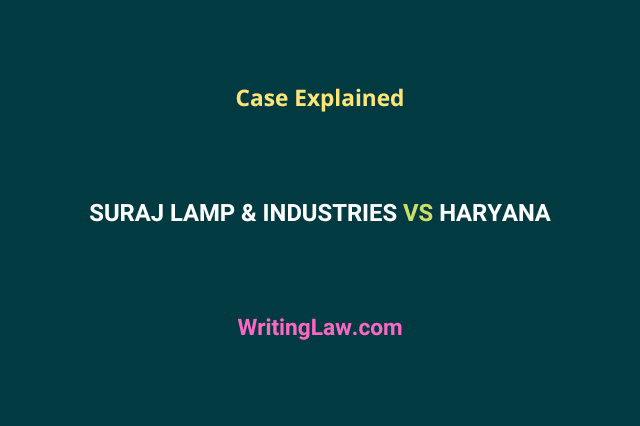
Suraj Lamp & Industries Pvt Ltd. vs State Of Haryana & Anr
Special Leave Petition (C) No. 13917 of 2009
Date of Judgment: 11 October 2011
- Court Name: Supreme Court of India
- Case Name: Suraj Lamp & Industries Pvt Ltd. vs State Of Haryana & Anr
- Case no.: Special Leave Petition (C) No. 13917 of 2009
- Petitioner: Suraj Lamp & Industries Pvt Ltd.
- Respondents: State Of Haryana & Anr
- Author: R V Raveendran
- Bench: R.V. Raveendran, A.K. Patnaik, H.L. Gokhale
- Date of Judgment: 11 October 2011
- Acts Applied: The Registration Act of 1908
The case of Suraj Lamp & Industries Pvt. Ltd. vs State of Haryana & Anr. was heard by the Supreme Court of India. Justice R. V. Raveendran delivered the judgment on October 11, 2011. The case dealt with the issue of General Power of Attorney Sales (GPA Sales) or Sale Agreement/General Power of Attorney/Will transfers (SA/GPA/WILL transfers), which were used to avoid legal and financial requirements related to property transfers.
Facts
The case involved the practice of SA/GPA/WILL transfers, where instead of executing a deed of conveyance, the parties would enter into agreements of sale, the general power of attorney, or will transfers. These transactions were primarily used to avoid payment of stamp duty, registration charges, and capital gains tax and to invest black money. The petitioner, Suraj Lamp & Industries Pvt. Ltd., challenged the validity and legality of such transactions.
Issues
- Whether SA/GPA/WILL transfers are legally valid and enforceable.
- Whether SA/GPA/WILL transfers lead to adverse consequences such as the generation of black money, growth of land mafia, and criminalization of real estate transactions.
- Whether measures taken by the states and the Union of India to discourage SA/GPA/WILL transfers are sufficient.
Arguments
The petitioner argued that SA/GPA/WILL transfers were illegal and should be declared void as they were used to evade legal requirements and generate black money. They contended that these transactions adversely affected the economy, civil society, and law and order.
The respondents, including Delhi, Haryana, Punjab, and Uttar Pradesh, agreed that SA/GPA/WILL transfers should be curbed as they led to revenue loss and increased litigations due to defective titles. They highlighted the measures taken to address the issue, such as amending the Registration Act and stamp laws to require registration and payment of stamp duty for SA/GPA/WILL transfers.
Judgment
The Supreme Court held that SA/GPA/WILL transfers were not legally valid and should be discouraged. The court observed that these transactions were used to avoid legal requirements and generate black money. They adversely affected the economy, civil society, and law and order. The court noted that although some measures had been taken by the states and the Union of India to address the issue, they were insufficient.
Principles Laid Down in the Case
- SA/GPA/WILL transfers are not legally valid and enforceable.
- SA/GPA/WILL transfers are used to evade legal requirements, generate black money, and facilitate the growth of the land mafia.
- Measures taken by the states and the Union of India to discourage SA/GPA/WILL transfers, such as amending stamp and registration laws, are inadequate.
Conclusion
The Supreme Court concluded that SA/GPA/WILL transfers were illegitimate and should be discouraged. The court highlighted the adverse consequences of these transactions and emphasized the need for more effective measures to curb them. The judgment aimed to prevent the generation of black money, protect the interests of buyers, and ensure the proper transfer of property in accordance with legal requirements.
- What Is the Burden of Proof Under the PMLA? - 18th April 2024
- Ranjit D Udeshi vs State of Maharashtra – Case Explained - 11th April 2024
- What Is Proceeds of Crime Under PMLA (With Case Laws) - 7th April 2024







